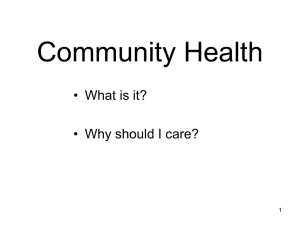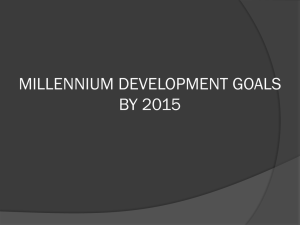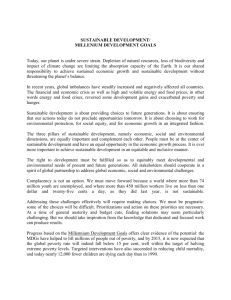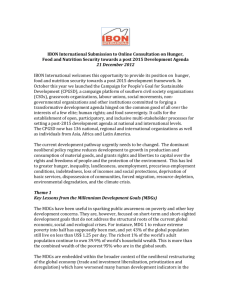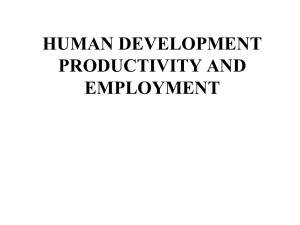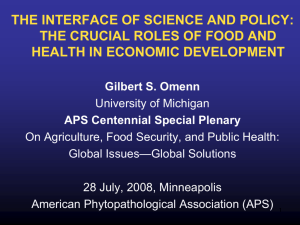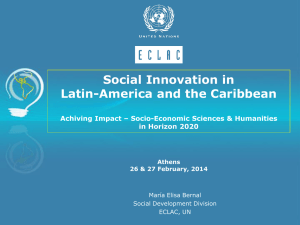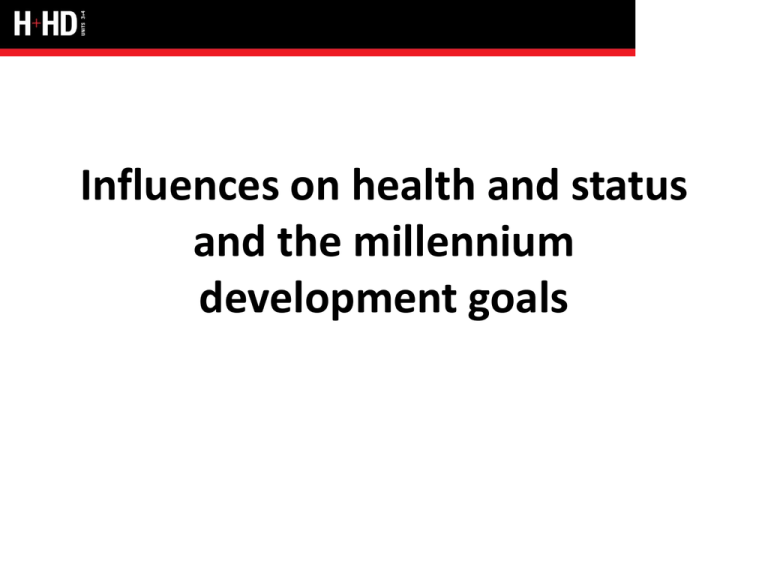
Influences on health and status
and the millennium
development goals
Influences on health status in
developing countries and Australia
• In general, there is a broad discrepancy
between the health status of people from
developed countries when compared to
people from developing countries
• Discrepancies exist in many areas, such as:
income, gender equality, peace, education,
access to health care, political stability, global
marketing, physical environments
Income
• Ultimately, it is income that will determine a
person’s health status and the overall health
status of the country in which they live
• Low income earners in Australia are protected
by government regulated employment
guidelines – the same does not apply to many
people in developing countries
Gender equality
• Gender equality means valuing equally the
roles of males and females and removing
prejudice based on sex
• Much of this inequality is faced by women,
but men too can face gender inequality
• A main issue associated with gender
inequality is the discrepancy that exists in
relation to education opportunities afforded
to boys and not girls in many countries
Peace
• During times of peace, countries can prosper
financially and developmentally
• During times of conflict, countries experience
increased poverty, disease, lack of education
and other opportunities
• Australia is considered a peaceful nation
• Some developing nations are constantly at
war
Education
• Education is critical to becoming a productive
member of society, earning an income, and
knowing how to access health care
• Lack of access to education, and resulting
illiteracy is a major issue for many developing
nations
• Australians generally have broad access to
primary, secondary and higher education
Access to health care
• Australians generally have excellent access to
health care including medical, pharmaceutical,
dental and nursing
• Many people in developing countries do not
have access to health care – with a direct
consequence being a shorter life
Political stability
• In Australia, we have a very low risk of political
instability and political debate generally
focuses on improving health care, education
and infrastructure
• In developing nations with political instability,
decisions regarding health care, education and
development are not on the agenda. Rather,
political debate may be focused on conflict,
war and weapons
Global marketing
• Global marketing refers to promoting a
product throughout the world
• Tobacco, alcohol and processed foods are
three products that have the biggest impact
on health status
• Developed countries – like Australia – have
strict rules surrounding the marketing of these
products
• Similar rules do not exist in developing nations
Physical environments
• Physical environments refer to external
surroundings – where a person lives, works
and engages in recreation
• In Australia, we have strict rules about
emissions, pollution and other similar hazards.
Such rules do not exist in many developing
nations
Millennium development goals
(MDGs)
• The United Nations MDGs are a set of 8 goals
that all UN member countries – and number
of international organisations - have agreed to
achieve by 2015
• The 8 goals are supplemented by 18 targets
and 60 indicators which have been set to
measure the achievement of the goals
• A yearly progress report is issued
The MDGs
1. Reducing poverty and hunger
2. Increasing the number of children who attend
school
3. Empowering women
4. Decreasing child mortality
5. Improving maternal mortality
6. Combating HIV, malaria & other diseases
7. Ensuring environmental sustainability
8. Global partnerships
Poverty
• Poverty has been described as the greatest
pollutant of the developing world
• Cost of food is an underlying issue in extreme
poverty
• A related consequence of poverty is
undernourishment
Achieve universal primary
education
• The most significant influence on helping
people escape for mire of poverty is education
• While achieving primary education is critical,
ultimately children also need secondary
education
Promote gender equality and
empower women
• As of 2008, girls accounted for 55% of the outof-school population
• Empowering women – through education and
other means – will increase the share of
women in wage employment and the
proportion of women in national parliaments
Reduce child mortality
• Millions of children die each year from
preventable causes in developing countries
• A child born in a developing country is over 13
times more likely to die in the first 5 years of
life than a child born in a developed country
• Preventable diseases such as measles,
malaria, diarrhoea and pneumonia are the
main causes of childhood deaths in
developing countries
Improve maternal health
• In many developing countries, the rate of
maternal mortality remains unacceptably high
• In sub-Saharan Africa, the rate of dying from
complications during pregnancy or birth is 1 in
22, compared to 1 in 7300 in developed
countries
• Access to antenatal care is essential for
improving maternal health
Combating diseases
• HIV/AIDS, malaria and other diseases are a
critical focus of the MDGs
• Deaths from these diseases are linked to lack
of prevention and treatment
• Prevention and education programs and
access to health care is essential
Environmental sustainability
• Climate change and poverty must be
considered as intertwined factors given that
climate change has a significant impact on
agriculture, patterns of disease and severe
weather occurrences
• Climate change is a significant issue for
developing and developed nations alike
• Access to clean drinking water is a critical
issue
Developing global partnerships
• In recent years, there has been a reduction in
the amount of aid and official development
assistance from developed countries to
developing countries
• Total aid provided by most developed
countries falls well short of the 0.7% target of
gross national income set by the UN in 2007.
Interrelationships between health,
human development and
sustainability
• Sustainability is the consideration of how we
can meet the needs of today without reducing
the capacity of future generations
• Human development is referred to as being
able to enhance one’s capabilities.
• Health, human development and
sustainability are intrinsically linked


